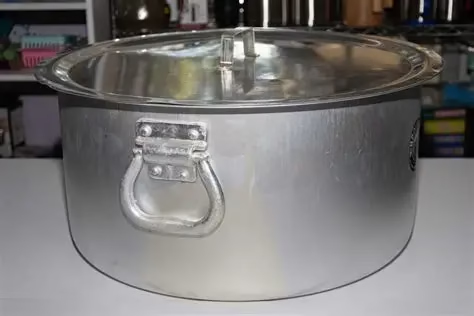In Kenya, a sufuria is more than just a pot; it’s the cornerstone of the kitchen, the vessel in which countless delicious meals are brought to life. From simmering rich stews and preparing a perfect batch of ugali to boiling water for tea, sufurias are indispensable for daily cooking in almost every Kenyan home. Understanding the different types, materials, and where to find quality sufurias for sale is key to equipping your kitchen effectively.
At Retail Place, we recognize the central role sufurias play in Kenyan culinary traditions. This comprehensive guide will help you navigate the world of sufurias, ensuring you make informed choices for durability, performance, and value.
The Enduring Importance of Sufurias in Kenya
Sufurias are versatile cooking pots that come in various sizes and materials, designed to handle a wide range of cooking tasks. Their importance stems from:
- Versatility: Ideal for boiling, simmering, deep-frying, and stewing – perfect for everything from githeri and mukimo to kuku stew.
- Cultural Significance: Certain sufurias might be designated for specific dishes, like the sturdy one for ugali that develops a much-loved crust.
- Durability: Good quality sufurias are built to last, often serving families for many years.
- Heat Retention & Distribution: Essential for evenly cooked meals, preventing burning and ensuring flavors develop properly.
Types of Sufurias and Their Materials: What’s Best for You?
The material of a sufuria significantly impacts its cooking performance, durability, and price. Here are the most common types you’ll find for sale in Kenya:
Aluminium Sufurias
Pros:
- Affordable: Generally the most budget-friendly option, making them accessible for many households.
- Excellent Heat Conductivity: Heats up quickly and distributes heat very evenly, preventing hot spots and ensuring food cooks uniformly. This is particularly good for dishes that require precise temperature control.
- Lightweight: Easy to handle, especially larger sizes.
- Commonly Available: Widely stocked across Kenya. Brands like Kaluworks (Lion King), Signature, Ndovu, Chefmaster, and Redberry are well-known for their aluminum sufurias.
Cons:
- Durability: Can dent, scratch, or warp more easily than stainless steel or granite if not handled with care.
- Reactivity: Can react with acidic foods (like tomatoes or lemon juice), potentially imparting a metallic taste or discoloring the food.
- Cleaning: Can be prone to staining or sticking if not properly maintained.
Best For: Everyday cooking, boiling water, preparing stews, and a classic choice for ugali. They come in various weights (light, medium, heavy, extra-heavy), with heavy-gauge options offering better durability and heat retention.
Stainless Steel Sufurias
Pros:
- Highly Durable: Resistant to rust, corrosion, and scratching, making them exceptionally long-lasting.
- Non-Reactive: Does not react with acidic or alkaline foods, preserving the true taste of your ingredients.
- Easy to Clean: Smooth, non-porous surface makes them very hygienic and simple to wash, often dishwasher safe.
- Sleek Aesthetic: Offers a modern and polished look in the kitchen.
- Good Heat Retention: Excellent for simmering and keeping food warm.
Cons:
- Price: Generally more expensive than aluminum.
- Heat Conductivity: Stainless steel alone is not the best conductor of heat. High-quality stainless steel sufurias will often have an aluminum or copper core encapsulated in the base to improve heat distribution. Look for “tri-ply” or “encapsulated base” features.
Best For: Everyday cooking, dishes with acidic ingredients, long-simmering stews, and those seeking a durable, premium option.
Non-Stick Sufurias (e.g., Teflon, Ceramic, Granite Coated)
Pros:
- Effortless Cooking & Cleaning: Food rarely sticks, requiring less oil and making cleanup incredibly easy. Ideal for frying eggs, making pancakes, or cooking delicate sauces.
- Healthier Cooking: Reduces the need for excessive cooking oil.
- Even Heat Distribution: Many non-stick sufurias have excellent heat distribution.
Cons:
- Durability of Coating: The non-stick coating can scratch, chip, or degrade over time, especially if metal utensils are used or if exposed to very high heat. Once damaged, the non-stick properties are lost.
- Price: Can be more expensive than basic aluminum sufurias.
- Care: Requires gentle handling and non-abrasive cleaning.
Best For: Frying, sautéing, cooking ugali without sticking, and dishes where easy release is paramount. Look for granite-coated or ceramic-coated non-stick sufurias, which are often advertised as more durable and scratch-resistant than traditional Teflon. Brands like Signature, JP Jamesport, and Dessini offer a range of non-stick sets.
Sizes and Sets: What Do You Need?
Sufurias are available individually or in sets, ranging from small pots (e.g., 10cm diameter) perfect for warming milk or making a small portion of sauce, to massive “big sufurias” (e.g., 50-100+ litres) used for catering or large family gatherings.
- Individual Sufurias: Ideal if you need a specific size or want to replace a single worn-out pot.
- Sufuria Sets: Offer a range of sizes, providing versatility for different cooking needs. A typical set might include 3-5 sufurias with lids. This is often more cost-effective than buying individual pieces.
Buying Tip: Assess your cooking needs. For a typical family, a set of 3-5 sufurias ranging from 18cm to 28cm in diameter is a good starting point. If you frequently cook for large gatherings, consider adding a larger sufuria (e.g., 30L or 50L).
Where to Find Sufurias for Sale in Kenya (Nairobi and Beyond)
You have a wide array of options when looking for sufurias in Kenya:
- Supermarkets: Major supermarkets like Carrefour, Naivas, Quickmart, and Chandarana Foodplus have dedicated kitchenware sections with a good selection of aluminum, stainless steel, and non-stick sufurias from various brands.
- Department Stores & Appliance Retailers: Stores like Hotpoint Appliances, Anko Retail, Vituzote.com, and other kitchen specialty shops (often found in major malls) offer a wider range, including premium brands and sets.
- Online Marketplaces: Jumia Kenya and Avechi are excellent platforms for comparing prices and brands, offering convenience and often good deals. Kilimall is another online option.
- Direct from Manufacturers/Distributors: Companies like Kaluworks Limited have their own shops or authorized distributors, ensuring genuine products. Bansi Suppliers also specializes in large capacity sufurias.
- Local Markets: For traditional aluminum sufurias, especially the heavier gauge ones, local markets can offer competitive prices and a chance to inspect the product physically.
Tips for Buying the Right Sufuria
- Consider Your Cooking Style: Do you prioritize quick heating (aluminum), durability (stainless steel), or non-stick convenience?
- Budget: Determine how much you’re willing to spend. Remember that a higher upfront cost for quality often translates to longer lifespan and better performance.
- Handles and Lids: Check for sturdy, heat-resistant handles (riveted handles are generally more durable than welded ones). Lids should fit snugly to retain heat and moisture. Glass lids are convenient for monitoring food.
- Base Thickness: A thicker base (especially for aluminum) indicates better heat distribution and less warping.
- Compatibility: Ensure the sufuria is compatible with your stovetop (gas, electric, induction, jiko).
- Authenticity/Brand: Buy from reputable retailers and recognized brands to avoid counterfeits and ensure quality.
A well-chosen sufuria set is an investment that will serve your Kenyan home for years to come. By understanding the materials, sizes, and where to shop, you can confidently select the perfect pots to prepare your favorite meals, making your kitchen truly the heart of your home.









